by Richard van Pelt, WWI Correspondent
The Capital Journal, concerned that reporting the news was secondary to interests of the belligerents notified their readers:
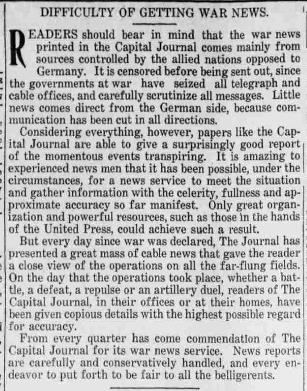 Even reporting the weather drew the following from the daily weather bird:
Even reporting the weather drew the following from the daily weather bird:
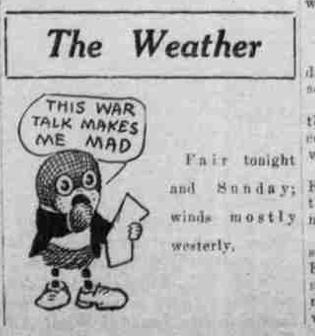 The World War imposed constraints upon the reporting of news. Getting the news out and meeting Rudyard Kipling’s definition of journalism became more difficult. Kipling, a journalist, poet, and writer, wrote that they had six serving men:
The World War imposed constraints upon the reporting of news. Getting the news out and meeting Rudyard Kipling’s definition of journalism became more difficult. Kipling, a journalist, poet, and writer, wrote that they had six serving men:
I keep six honest serving-men
(They taught me all I knew);
Their names are What and Why and When
And How and Where and Who.
I send them over land and sea,
I send them east and west;
But after they have worked for me,
I give them all a rest.
I let them rest from nine till five,
For I am busy then,
As well as breakfast, lunch, and tea,
For they are hungry men.
But different folk have different views;
I know a person small—
She keeps ten million serving-men,
Who get no rest at all!
She sends’em abroad on her own affairs,
From the second she opens her eyes—
One million Hows, two million Wheres,
And seven million Whys!
Headlines from today’s Capital Journal:
Battling All Along the Front – fierce Artillery duel Starts Along Front of Seventy-Five Miles – 300,000 Germans Along River Meuse – Officers Would Sacrifice One-third of Them in Order to Capture Brussels.
Of Five Thousand German Uhlans One Fifth Remain – Four Out of Five of These Superbly Brave Soldiers Dead or Wounded
Turkey Is Saucy And Is Preparing To Get In Game – Sultan Is Rushing Military Preparations and Will Probably Aid Germany – Austria Is Sore At Italy’s Action – Wanted To March Four Army Corps Over Italian Soil But Was Refused
The Oregon Statesmen headlined “German Artillery Lays Liege Waste – Streets Plowed Up Like Cornfields: Inhabitants Flee
London, Aug. 15 – (2 A.M.) –
The Daily Telegraph’s correspondent at Brussels says that a refugee from Liege told the following story:“Thirty thousand inhabitants fled when the shells began to fall. The remaining inhabitants buried themselves in cellars. Havoc marks the city everywhere. Gaping bridges, demolished houses, fallen roofs and smoldering ruins were seen on all sides. There is no street wherein the shells have not fallen. the asphalt is plowed up like a corn field. Newly made graves protrude in unexpected places.
Nights Are Ghastly
“During the day the Germans are everywhere in evidence and the inhabitants are cowed in dumb dismay. During the night the city assumes the aspect of a graveyard, the silence being broken only by the distant thunder of heavy guns or the tread of German patrols.“All doors in the city must be kept wide open. The Germans compel the bakers to turn over the entire product of the bakeries to the army every morning. And while the inhabitants go hungry the soldiers cook meals in the streets in great cauldrons. All the principal streets are barricaded and the German soldiers show recklessness in scouting in the neighborhood of the forts.”



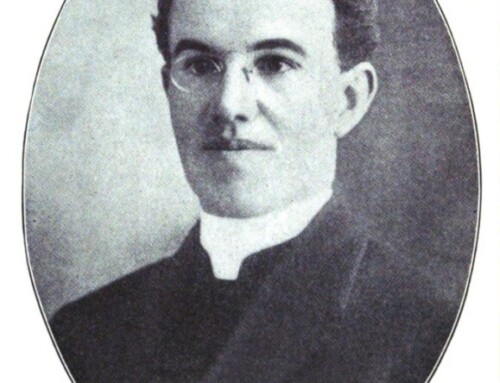
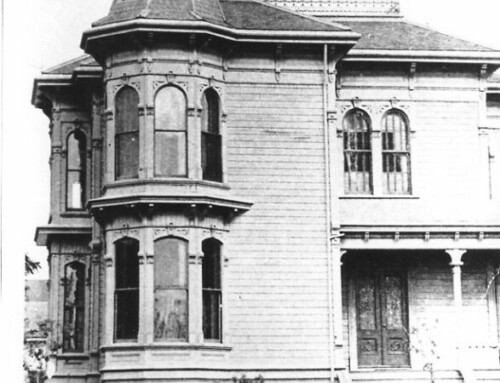
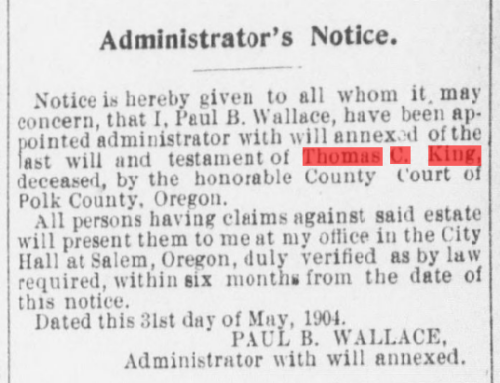

Leave A Comment